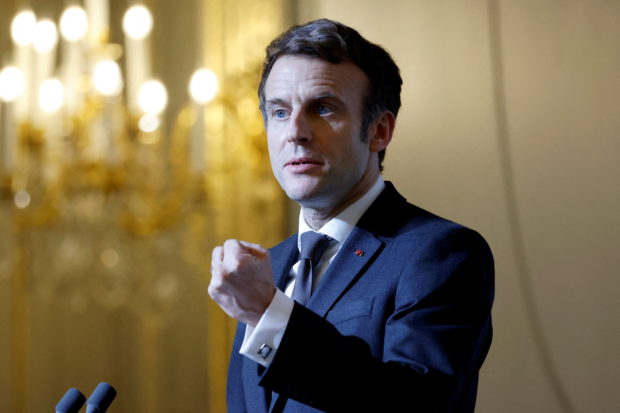Ahead of election, Macron banks on rosy French economy, new jobs

FILE PHOTO: French President Emmanuel Macron delivers a speech during a presentation of the traditional epiphany cake at the Elysee Palace, in Paris, France January 12, 2022. Ludovic Marin/Pool via REUTERS
PARIS — President Emmanuel Macron will on Monday tout 21 new foreign investment projects in France and a booming economy as proof his economic reforms have been bearing fruit less than three months before a presidential election in which he is expected to run.
During a visit to Alsace in the east, Macron will announce a 300-million-euro ($342 million) industrial project by German chemical giant BASF, one of 21 new projects worth 4 billion euros and 10,000 jobs as part of a drive to attract foreign investors, his office said.
As the presidential race heats up, his aides are keen to shift the debate away from immigration and law-and-order issues and put the spotlight on the economy, which has been recovering strongly from the COVID-19 pandemic.
“This is the result of all the reforms that were carried out since the start of the mandate,” a presidential aide told reporters.
“Three months before an election, we could have expected investors to be in wait-and-see mode because of the uncertainty of an election. Instead, we see very strong confidence from foreign investors in the president’s economic policy,” he said.
Article continues after this advertisementSince 2017, Macron has pushed through a cocktail of supply-side economic reforms meant to boost businesses’ competitiveness, cut taxes on investors and loosen strict labor market rules.
Article continues after this advertisementCritics say he has acted as “president of the rich” who wants to do away with France’s cherished social safety nets and has cut welfare benefits for some of the poorest.
But three months ahead of the April election, indicators show the French economy is booming, with growth expected to have hit 6.7% in 2021 and France having returned closer to pre-pandemic levels than any G7 peer bar the United States.
Macron supporters also received an unexpected boost from economist Paul Krugman on Friday.
“In fact, among major advanced economies, the star performer of the pandemic era, arguably, is … France,” he wrote in his New York Times column